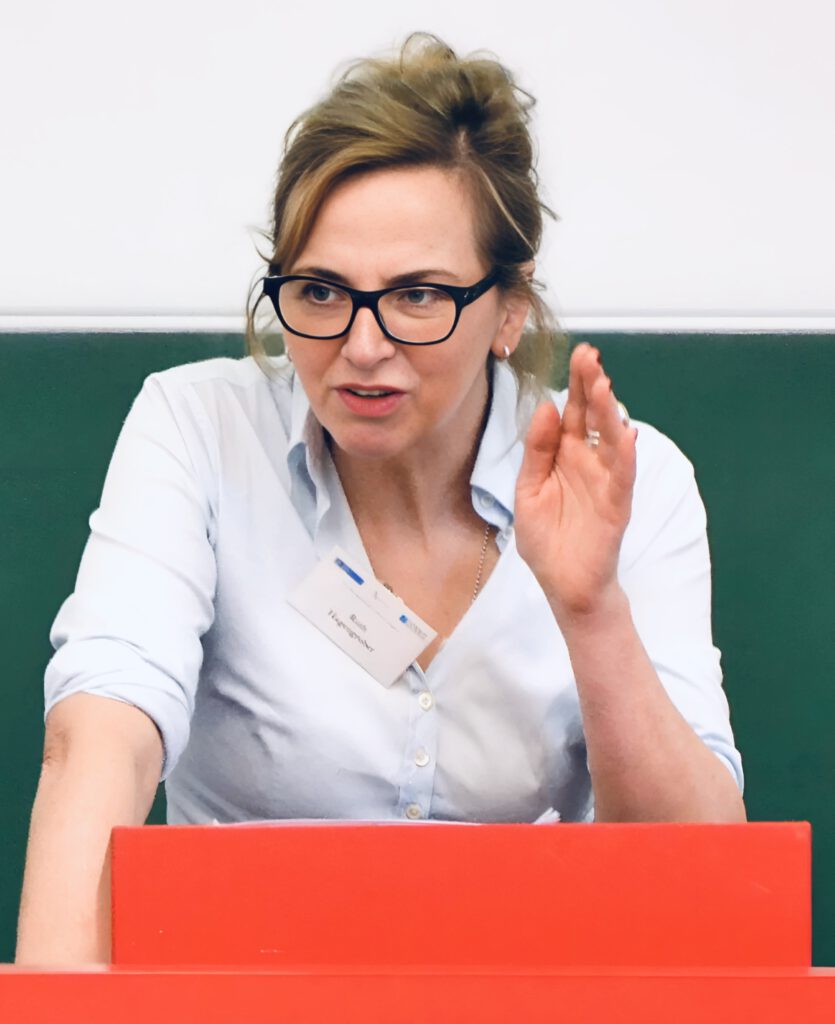On February 28, 2025, Ruth Hagengruber was elected as the first female president of the Deutsche Gesellschaft für Philosophie (DGPhil). At SAFI, we are not only thrilled for her but also for the opportunities she has to reshape the perception of German philosophy. Get to know her in this brief interview while you enjoy your coffee!
SAFI: Ruth, you are deeply committed to highlighting the contributions of women in the history of philosophy. What challenges do you frequently encounter in this endeavor, both within and outside the academic sphere?

Ruth Hagengruber: It is well known that challenges abound when trying to think outside the box. My research focuses on reconstructing the history of women philosophers’ ideas, and yet many philosophers consider this something alien to the philosophical tradition.
However, I see this research as the driving force behind a new social movement for a better social order. Equality cannot simply be realised by decree, which can be seen as a weakness of feminist theory. The challenge is to recognise this new social and cultural order as historically rooted. Social mobilisation must be rooted in history and recognisable as a historical and cultural phenomenon that has always existed in some form, much like vehicles that were dreamt of long before they were invented.
SAFI: In 2023, you delivered a keynote at the “Rechtsphilosophinnen” conference in Salzburg, supported by SAFI. What role does legal philosophy play in your thinking, and how do you perceive the relationship between philosophy and law in the recent years?
Ruth Hagengruber: I have even published two articles on the philosophy of law, one on divorce justice, which I co-authored with a colleague. In general, many of my ideas deal with legal issues. I have written about utopias, economic order, the concept of utility and universal rules in economic thinking and in the context of sustainability. I find that my work is closely linked to questions of legal philosophy. And of course it is crucial when we talk about gender equality.
SAFI: The occasion for our brief get-together is your new role as president of the Deutsche Gesellschaft für Philosophie. A heartfelt congratulations from all SAFI members! Which topics or projects do you intend to prioritize?
Ruth Hagengruber: ‘Rethinking Europe’ will be the motto of my term of office. What I find interesting about it is that what others get upset about is, for me, the best thing about Europe: that it is not a national entity, but encompasses many national entities and is itself a philosophical idea. But what is it and how does it work? I want to find out how far these ideas can take us and how we can use them to shape a good future.
The confrontation between violence and reason dominates the world today. In my opinion, analysing these phenomena is a core topic of philosophy. I also see the connection to the philosophy of the Enlightenment, which also emerged from a time of violence and nonetheless succeeded to make progress in the areas of education, state, gender equality and science.This is where I would like to start and try to rethink Europe and make my contribution to this as President of the German Society for Philosophy.
SAFI: While some well-intentioned male colleagues today often remark, “Don’t worry, you’ll be fine – you’re a woman,” the reality is that the promotion of women in academia is facing increasing challenges. This trend is not only evident across the Atlantic, where gender-focused initiatives are increasingly scrutinized, but also in Europe, for instance, with the discontinuation of women’s career programs in Austria[1] and the failure of German research funding institutions to adequately recognize the impact of caregiving responsibilities on academic careers[2].
Ruth Hagengruber: I actually believe that this development could have been different and that we ourselves have failed to do much to safeguard and defend liberal values. In my opinion, it was the same situation that changed the Enlightenment into the French Revolution. We should all make a concerted effort to explain the values and the long-term effectiveness of these liberal and reasonable values for security and prosperity in order to halt and reverse this development. The promotion and recognition of the excellence of women’s ideas for our society is paramount.
SAFI: SAFI is committed to supporting women in academia. What advice would you give to young women scholars aiming to build an academic career in philosophy or legal philosophy? What advice do you wish you had received earlier?
Ruth Hagengruber: I received wonderful support from women’s organisations and from female and male colleagues who encouraged me. Of course, I have also experienced the opposite. My advice? Check carefully whether you really want what you are aiming for. We need perseverance and a goal that we want to achieve. The quality of the goal determines the degree of danger you anticipate from others, as well as your own ability to persevere. In most cases, these two challenges go hand in hand. Violence and self-alienation are closely linked and so is the opposite.
SAFI: Last question: How do you like your coffee?
Ruth Hagengruber: Yes, I love black, hot coffee, and I prefer the Neapolitan variety!

Learn more about Ruth Hagengruber on her website, where you can also find out more about her many projects like the Encyclopedia of Concise Concepts by Women Philosophers (eds Ruth Hagengruber & Mary Ellen Waithe), and make sure to check out the new website of the DGPhil!
This interview was conducted in 2025 by Kristin Albrecht for SAFI.
[1] See https://www.trend.at/karriere/fwf-will-mit-neuer-jungforscher-schiene-frauenfoerderung-verbessern It is argued by the FWF that there was a significant decline in applications for the Elise-Richter-Program, a habilitation initiative aimed at promoting the university careers of outstanding female scientists. In response, the FWF introduced the ASTRA-Prizes, which were awarded for the first time in 2025. At the moment, the prize is not continued due to the political changes in Austrian politics.
[2] See https://safi-network.org/blog/care-und-unfair/.